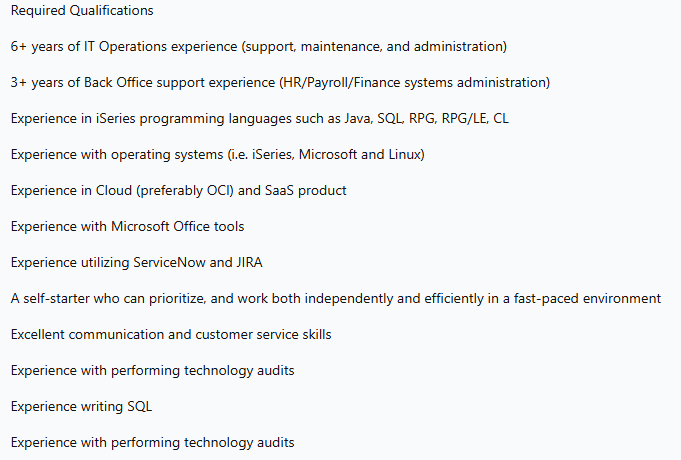Excessive Requirement Blues: Many job postings list excessive qualifications for entry-level roles, creating unrealistic expectations for candidates and leaving recruiters to sift through unqualified applicants.
Reality Check for Employers: Employers need to reevaluate their entry-level job criteria, ensuring that they match the actual capacities of candidates entering the workforce rather than creating barriers.
Job Market Confusion: The mismatch between job requirements and actual entry-level capabilities adds to the confusion in the job market, making it hard for fresh talent to find opportunities.
For anyone in recruiting, this will be a familiar story. An entry level position is posted on a popular job board and provides a laundry list of required qualifications that seem out of touch with the reality of what you can expect from someone seeking an entry level position.
The result is one of two things.
1) Application rates are low and the job description is eventually adjusted to suit the person who is actually seeking it. This trend appears in data from PwC that shows a decline in employers actually hiring for entry level roles, down to 61% in 2023 from 79% in 2022. Or...
2) Applicants still pour in and the few who meet the qualifications demand pay far above what an entry level position would provide. In the end, the job description is eventually adjusted to suit someone with entry level experience and the budget for the role.
Here’s an example. Below you’ll see a screenshot of an open "entry level" position in IT that was picked apart in a Reddit thread recently.

For the sake of not posting the entire ad, the screenshot doesn’t even include the list of “desired qualifications that followed it.
If you’ve entered the professional world recently, there’s a good chance you’ve experienced applying to these jobs personally and been left with a common question. How would I get all of that experience if I’m just starting out? This sentiment shows up in data.
- 42% of employees feel excluded from job opportunities due to a lack of formal qualifications or experience. (TestGorilla)
- The second most common barrier to employment was a lack of experience, relevant skills, credentials or education. (McKinsey)
The Truth About Job Descriptions
While job descriptions make for interesting reading and give the job seeker a good idea of the company’s needs, one thing they shouldn’t be is a comprehensive wish list of all the things a company wants for a certain department. Unfortunately, all too often, that’s exactly what they are.
“Entry-level jobs should be about learning and growth, not proving you’ve already conquered the workforce,” says Kraig Kleeman, Founder and CEO of The New Workforce. “If businesses want loyal, motivated talent, they need to stop hunting unicorns and start training horses.”
This labeling of unicorns and horses is common among talent acquisition professionals. All too often, the result of these overly demanding job ads is time spent proving that something doesn’t exist.
“I recruit for very specific technology needs,” Elena Agaragimova, Talent Acquisition and Development Manager at Horizon Industries said. “A hiring manager sends what they need and what they’re looking for is a unicorn. We then have to prove to them that this candidate doesn’t exist by providing four weeks of candidates that don’t fit the profile. By the time we’re done, they just hire a horse, which is what we should have been looking for to begin with.”
Why Do Companies Set Entry Level Requirements Too High?
On the surface it seems counterintuitive to essentially push people away from your job opening. So it begs the question; why do it?
There’s a few reasons companies fall into this trap. The first is a desire to find someone who can hit the ground running. The issue is, they seem to have forgotten the nature of an entry level position in the first place
“Entry-level roles are supposed to be stepping stones, not finished products,” says Peter Lewis, Head of Growth at Webstreet. “When businesses demand too much from these roles, it suggests they lack the willingness (or the systems) to train new talent. It also says a lot about their priorities—businesses that prioritize short-term efficiency over long-term growth are going to struggle with building a strong team culture.”
Short term thinking
Another reason comes down to an organization’s overall talent strategy. Many orgs take a risk averse approach to talent, instead looking for someone with an ideal skillset because it feels safer than a candidate who needs development.
“When businesses inflate entry-level job requirements, it signals that their talent strategy is not created for the long-term,” Justina Raskauskiene, HR Team Lead at Omnisend says. “Instead of investing in and nurturing new talent, they are prioritizing short-term convenience, but it almost always leads to higher turnover.”
The Fallout
As you can imagine, this practice of over demanding in job descriptions has a negative impact when it comes to talent recruitment. It doesn’t just drive job seekers away, it also undermines other efforts such as your DEI goals and attempts to connect with younger workers.
“This trend is killing opportunities for young professionals or career changers,” Lewis says. “It's making the job market feel inaccessible, which discourages people from applying altogether. These barriers also disproportionately affect marginalized groups, including first-generation college grads or those without traditional degrees. Companies need to remember that potential talent exists in many forms—some just need the chance to develop.”
It also has an impact on people. It’s been well documented over the last two years that Gen Z already feels unprepared for the workplace when they come out of college and many employers echo that.
Setting the bar too high only serves to further diminish confidence and undermine the growth mindset many leaders saying they’re trying to cultivate.
“The ripple effect is brutal,” says Kleeman. “Young professionals fresh out of school struggle to make ends meet. Many are forced into unpaid internships, freelance jobs, or part-time jobs that don't align with their career goals. And don't forget the emotional drain - rejection after rejection can lead to loss of motivation and confidence. This widens the unemployment gap, as not everyone can afford to spend months or years gaining unpaid experience to land an entry-level position.”
The Solution
So we should change job requirements, right? Use the latest recruiting software to streamline job descriptions and strip the requirement of a college education to make it so anyone with a can-do attitude and good interviewing skills can find an opportunity with your org?
Well, not exactly. But we do need to change the way businesses view their investment in talent and how HR can help increase the return on that investment.
“HR can implement mentorship programs, internal development opportunities, and start rethinking must-have vs. nice-to-have skills,” says Lewis. “The focus should be on finding candidates who are adaptable, eager to learn, and culturally aligned with the company. Skills can be taught, but attitude and work ethic are often innate.”
To do it, your talent strategy and the mentality behind it have to change. First, businesses need to see the value in long-term investment, which according to Lewis is a mentality shift from “buy” to “build.”
“That might mean creating apprenticeships, or even offer entry-level candidates the chance to learn as they go while on the job,” he says. “By lowering the bar on entry-level positions and focusing on building talent in-house, businesses can develop loyal, highly-skilled employees over time.”
Back to the job posting
It’s also time to rethink those job ads. For talent acquisition teams, these means level setting with hiring managers to get real on what the role requires from the start.
“HR teams need to review role requirements with hiring managers and conduct internal job audits to ensure that ads represent the true nature of the position,” says Raskauskiene.
She also emphasized the need to revisit the hiring strategy as a whole to ensure that the company retains talent and is set-up for success in the long run. While retaining them is great, it doesn’t stop there. You’ll need to back that up with a learning plan to keep them engaged.
“What we do at Omnisend, is offer every employee an unlimited learning budget for conferences, courses, and anything else that would help them hone in their skills, says Raskauskiene. “This allows our employees to create a personalized training program for themselves, helping them focus on specific areas of improvement. In return, the company gains a significantly more engaged and skilled workforce, while the learning budget itself acts as a tool for employer branding.”
What's Next?
Want to keep up with the latest trends in recruitment and hiring while receiving more expert insights like these? Subscribe to the People Managing People newsletter and you'll get all the latest tips and techniques from industry leaders and experts straight to your inbox.


